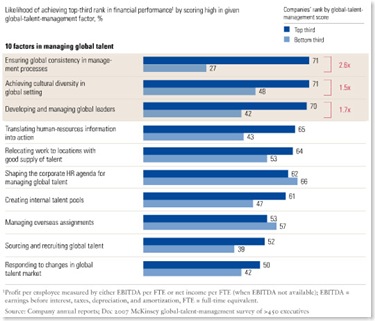First, the findings:
There is a surprisingly tight relationship between financial performance, as measured by profit per employee and ten dimensions of global talent management (see graph).
Companies scoring in the top third of the survey (when all ten dimensions were combined) had a 39% higher profit per employee than those in the bottom third.
The correlations were particularly striking in three areas:
- The creation of globally consistent talent evaluation processes
- The management of cultural diversity
- The mobility of global leaders.
"Companies achieving scores in the top third in any of these three areas had a 70 percent chance of achieving top-third financial performance (see graph). Companies scoring in the bottom third of the survey in these three areas had a significantly lower probability of being top performers, particularly if the company had inconsistent global talent processes."
Those are pretty remarkable findings. But there are some problems, and McKinsey themselves point out that:
"Although providing no evidence of true causality and lacking a longitudinal perspective, the strong associations between company financial performance and these global-talent-management practices strengthen our belief that these are important areas on which businesses and HR leaders should focus their attention."
But my main reservation focuses on their choice of profit per employee as a measure of the impact of talent management. This is clearly going to be much higher in knowledge based sectors where the 3 or 10 practices identified by McKinsey are going to be more common.
So the research basically says that companies which invest more in talent are often knowledge based (as talent is where their knowledge comes from). Knowledge based companies have higher profits per employee (as knowledge based work has higher margins than production based work). So, companies that invest more in multinational talent management will have often have higher profits per employee.
It's as good as saying this is research. Research is supposed to show you something. This is supposed to show you something.
Unfortunately, it doesn't.































Oh let's rewrite this!
ReplyDeleteI read McKinsey daily but I expect what they say to be self interested. It is often rather vague and coded. I think what they are saying here is that when you can afford to focus on a truly multinational team you are also doing pretty well!!
I agree with you regarding the anomalies in McKinsey's research Jon.
ReplyDeleteI'd really like to see the values they have used to class things such as 'managing cultural diversity' and 'developing and managing global leaders', even 'translating HR information into action'. Take the last, for example. Have McKinsey done an audit of all the HR information to be disseminated from every HR department globally?
Hewitt, for example, use a mix of criteria for their 'top employer brand' that shows ZERO correlation with results of, say, the CNN/Fortune list, which is driven by employee 'say'.
It's interesting to see the research nonethless, but shows how fraught such a task can be, and not easy for anyone.